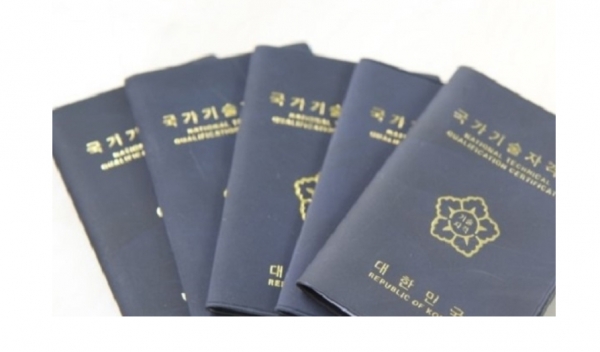Is it possible for certification for foreigners in Korea? Foreign professionals working in South Korea are building their careers across various industries and environments while exploring new opportunities. However, if they are still unfamiliar with the Korean job market or workplace culture, they may feel the need to prepare more to strengthen their competitiveness. In such cases, obtaining certifications in Korea and creating a structured learning plan for skill development can be extremely helpful.
There are countless certification systems and educational programs available in Korea, and how you choose and utilize them can significantly influence the speed and scope of your career growth. It’s important to clearly define your field and career goals in order to develop your capabilities efficiently without redundant investments. For example, a foreigner working in the IT industry may consider certifications like the “Information Processing Engineer” or international cloud certificates, while someone in the education sector may aim for the “Korean Language Teacher Certificate.”
The main challenge, however, is that there are so many certifications and learning contents to choose from that it can feel overwhelming. On top of that, balancing study time with busy work schedules can be difficult. In this article, we will introduce examples of valuable certifications for foreign professionals in Korea and share effective learning strategies for upgrading your skills efficiently.
How to Choose Popular Certifications in Korea
Among the most well-known certifications in Korea are those related to computerized accounting or tax management. These certifications can be appealing to professionals aiming to transfer to finance or accounting departments, or those who want to enhance their personal financial knowledge. For foreigners, dealing with economic matters in Korea requires understanding not only the language but also institutional features, and studying for these certifications can naturally lower those barriers.
In the IT field, technical certificates such as “Information Processing Engineer” or “Network Manager” are also popular. Even non-Korean nationals can obtain these if they have relevant experience and sufficient Korean reading comprehension skills. The main issue, however, is that most national technical qualification exams are conducted in Korean, so a solid understanding of professional terminology and reading ability is essential to pass.
If you already have internationally recognized certifications, you may not need to pursue overlapping Korean ones. For instance, in programming or cloud technology, holding global certificates like AWS or Azure may often be more valued in practice than local ones. Therefore, it’s crucial to discern which certification—domestic or international—truly serves your career needs. That said, having Korean certifications can still positively impact performance evaluations or promotions at Korean companies, so it’s worth considering them as additional advantages.
That doesn’t mean you should take every exam available. Some certifications that are difficult for foreigners to acquire include practical tests or interviews conducted in Korean, which can be burdensome. It’s wise to evaluate in advance how much the certification will actually be applicable in your job and whether it has long-term value. For instance, the “Licensed Real Estate Agent” license may be attractive if you plan to work with foreign investors or residents in real estate, but otherwise, the time and cost investment may not be worthwhile.

Using Learning Resources and Online Platforms for Skill Improvement
Korea offers a wide variety of online learning platforms provided by public institutions and private education companies. These platforms offer professional training courses and certification prep classes that busy professionals can access during their commute or weekends. In particular, K-MOOC (Korean Massive Open Online Courses) provides many free courses, making it a great way to get started without financial burden. However, note that not all courses offer multilingual subtitles for foreigners, so improving your Korean proficiency to some extent could be beneficial.
Another good approach is to actively utilize in-company education systems. Some large corporations or IT companies run online lectures, seminars, and study groups for their employees, and foreign staff are often equally eligible to participate. These in-house programs directly align with company needs and can have a positive impact on job performance. Joining corporate clubs or study groups can also enhance learning outcomes, as sharing knowledge and exchanging feedback with peers is far more effective than studying alone.
If you’re not yet fluent in Korean, consider taking courses conducted in other languages. Global online education platforms such as Udemy, Coursera, and edX offer courses in IT, business, and marketing—with completion certificates available. However, before enrolling, it’s recommended to check whether the course content matches the skills valued by Korean companies or society. Otherwise, you might end up studying diligently but gaining little advantage for your career development if the program does not directly connect to recognized certifications or frameworks in Korea.
Exam Preparation Strategies and Time Management Tips
For working professionals, the most crucial factors in exam preparation are time management and physical stamina. For foreigners, language barriers add another layer of challenge, consuming extra energy just to interpret questions. Therefore, it’s essential to plan ahead on how to allocate study time during weekday evenings and weekends. For example, you can focus on theory for 30 minutes to an hour on weekdays and dedicate weekends to solving problems or taking mock exams.
Practicing with as many previous exam questions as possible is one of the most effective ways to improve your chances of passing. If your Korean reading skills are not yet fluent, it may be difficult to manage time during the test, so start by translating questions or listing key terms. When the workload feels overwhelming, joining a study group or engaging with online communities and forums can help maintain motivation. Once you gain confidence in solving problems, practice completing the exam within the time limit. Since reading Korean passages can take longer, improving your reading speed beforehand will help you stay calm during the actual test.
It’s also wise to check whether the certification you’re pursuing could affect your visa extension or change of employment visa. Certain professional certifications (such as E-5 or E-7 categories) are recognized or prioritized for specific visa types. Knowing this can boost motivation beyond simply passing the test, as it could provide additional benefits when applying for a visa status change after certification.
Case Study: How a Thai Professional Named A Successfully Shifted Careers with a Korean Language Teaching Certificate
A, a professional from Thailand, started exploring a new career path while working in an administrative role after graduating from a Korean university. After seeing friends teach Korean to foreign learners, A developed an interest in education and decided to pursue a Korean Language Teacher Certificate. However, the certification required in-depth knowledge of subjects such as Korean linguistics and teaching methodology—all conducted in Korean—which was initially challenging. A dedicated about two hours each evening after work to attend online lectures and joined a study group on weekends to practice teaching demonstrations and gain valuable experience.
After more than a year of preparation, A successfully obtained the certificate and later secured a position as a Korean language instructor at an international exchange center. This new role allowed A to use language skills more extensively and enjoy the satisfaction of teaching foreign students directly. A shared, “At first, the Korean language itself felt like a huge barrier, but once I became certified, I gained recognition as a professional in the field,” and mentioned plans to pursue additional instructor certifications or a master’s degree. This story shows that earning a certification can be more than a line on a résumé—it can open the door to a complete career transformation.
Conclusion: Certification for Foreigners in Korea, Set Clear Goals and Focus on Practical, Career-Connected Learning
For foreign professionals, obtaining a certification in Korea can be quite challenging due to language barriers and unfamiliar exam formats. However, if you choose certifications aligned with your current industry or those that can help you pivot to a new career, your efforts can yield significant synergy effects. Stay consistent with your studies while managing your time and physical wellbeing, and make the most of available resources such as online courses, internal training programs, and study groups.
Rather than focusing solely on “passing the test,” it’s more valuable to appreciate the professional knowledge, networking opportunities, and confidence you gain throughout the process. For foreigners seeking recognition at Korean workplaces—or aiming to branch out into new fields—consider acquiring the right certifications and planning your skill-building journey ahead. Remember, the doors to career advancement open proportionally to the effort you invest, so set clear goals, stay persistent, and continue moving forward toward your career growth.

K-Name Studio: Create your perfect Korean name based on your personality and style.
What’s My K-Beauty Personal Color?
WeBring Service : Provides personalized services to foreigners living in Korea
Exclusive offer: Introducing foreign car rental in Korea, WeBring-SoCar

